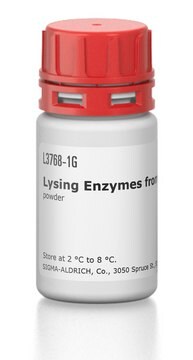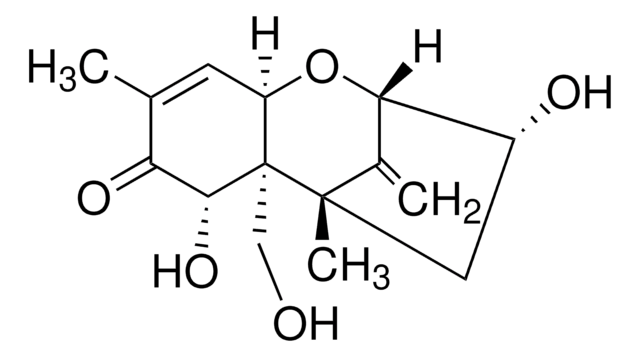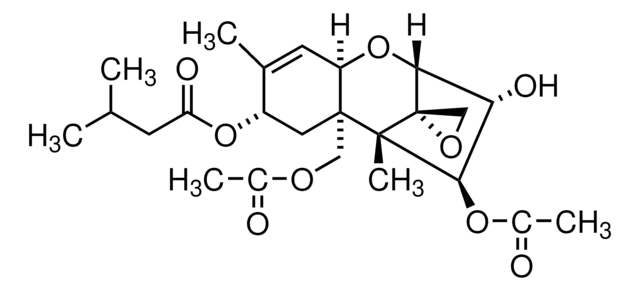D0156
Deoxynivalenol
Sinónimos:
3α,7α,15-Trihydroxy-12,13-epoxytrichothec-9-en-8-one, Vomitoxin
About This Item
Productos recomendados
formulario
powder
Nivel de calidad
temp. de almacenamiento
2-8°C
cadena SMILES
[H][C@]12O[C@]3([H])[C@H](O)C[C@@](C)([C@]34CO4)[C@@]1(CO)[C@H](O)C(=O)C(C)=C2
InChI
1S/C15H20O6/c1-7-3-9-14(5-16,11(19)10(7)18)13(2)4-8(17)12(21-9)15(13)6-20-15/h3,8-9,11-12,16-17,19H,4-6H2,1-2H3/t8-,9-,11-,12-,13-,14-,15+/m1/s1
Clave InChI
LINOMUASTDIRTM-QGRHZQQGSA-N
¿Está buscando productos similares? Visita Guía de comparación de productos
Descripción general
Aplicación
- as a mycotoxin to induce cytotoxicity in porcine jejunal epithelial cells and study the protective effects of Saccharomyces cerevisiae on the cell viability of host cells.
- to induce toxicity in nude mice to study the effect of probiotics (Lactobacillus rhamnosus GG (LGG) or Lactobacillus acidophilus (LA)) supplementation on host protection
- as a thyroid hormone receptor (TRβ) antagonist in cell-based luciferase reporter gene (CALUX) assay
Acciones bioquímicas o fisiológicas
Palabra de señalización
Danger
Frases de peligro
Consejos de prudencia
Clasificaciones de peligro
Acute Tox. 2 Oral
Código de clase de almacenamiento
6.1A - Combustible acute toxic Cat. 1 and 2 / very toxic hazardous materials
Clase de riesgo para el agua (WGK)
WGK 3
Punto de inflamabilidad (°F)
Not applicable
Punto de inflamabilidad (°C)
Not applicable
Equipo de protección personal
Eyeshields, Faceshields, Gloves, type P2 (EN 143) respirator cartridges
Certificados de análisis (COA)
Busque Certificados de análisis (COA) introduciendo el número de lote del producto. Los números de lote se encuentran en la etiqueta del producto después de las palabras «Lot» o «Batch»
¿Ya tiene este producto?
Encuentre la documentación para los productos que ha comprado recientemente en la Biblioteca de documentos.
Los clientes también vieron
Nuestro equipo de científicos tiene experiencia en todas las áreas de investigación: Ciencias de la vida, Ciencia de los materiales, Síntesis química, Cromatografía, Analítica y muchas otras.
Póngase en contacto con el Servicio técnico









